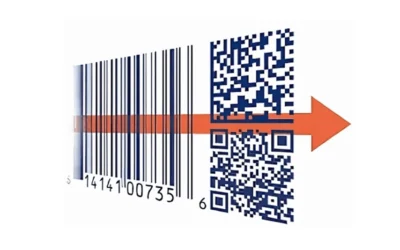RFID technology coupled with Electronic Product Code (EPC) validation is the most efficient way to track products from the manufacturing facility to the showroom floor. RFID and EPC validation help retailers to:
- Confirm that a particular item is present
- Identify what type of product it is
- Count how many of a particular item is present
- Identify each specific item uniquely
- Determine where inventory items are located
What is Electronic Product Code (EPC)
The Electronic Product Code (EPC) is a groundbreaking technology in inventory management. EPC, a type of RFID technology, provides unique identifiers for products, enhancing tracking and management efficiency.
EPCs are unique strings of numbers (not unlike the numbers represented by bar codes) that assign a distinctive identity to any object. These codes are embedded into RFID tags created with an RFID printer. Each electronic product code not only identifies the type and class of an object, but it also identifies the unique object apart from other identical objects. That way, if a size medium pair of white socks goes missing, retailers will know precisely which pair of socks it was out of thousands of the same.
Even more impressive is that unlike barcodes, when EPCs are combined with RFID, tagged items can be detected, located, identified and counted instantaneously without the need to manually scan each item with an optical laser. This aspect alone saves retailers an impressive amount of money in labor costs and allows sales associates to spend more time in customer-facing roles.
What Are the Most Important Benefits of EPC Data Validation?
From a business and financial perspective, the benefits of EPC validation are numerous. Here are four of the most important reasons why businesses should deploy this technology:
- Ensure data integrity: EPC code validation prevents labeling mistakes and thereby prevents shipping errors. This represents an enormous cost savings for large-scale retailers who suffer millions of dollars in losses as a result of mislabeled products. It also keeps customers happy by ensuring they receive the exact product they ordered, on time, as promised.
- Automate order processes: RFID EPC validation allows retailers to automate their entire ordering and restocking process. This ensures that products are available at all times, so customers do not experience unnecessary delays, which are frequently caused by restocking mistakes.
- Deliver products to correct sales channels: Delivering products to the wrong sales channels is a common and costly headache experienced by retailers. EPC data allows retailers to instantly know if their products have accidentally gone to the wrong sales channels.
- Keep Counterfeiters at Bay: Even the largest retailers can fall victim to counterfeiters, causing fake goods to be sold to loyal customers. When these kinds of mistakes are revealed to the public, it can seriously damage a retailer’s reputation. However, with RFID electronic product code validation, retailers will immediately know the difference between a fake product and a legitimate one because it’s impossible for counterfeiters to replicate the original manufacturer’s EPC codes.
PortalTrack: The Best Choice for EPC Validation
MSM Solutions’ PortalTrack EPC verification system is the most efficient and technologically advanced choice for EPC validation on the market. PortalTrack ensures accuracy when printing RFID tags and labels, allowing retailers to cost-effectively exceed the expectations of their customers through unprecedented inventory accuracy and visibilty.
PortalTrack complies with GS1 industry standards and is favored by loyal brands and corporations throughout the world. It has also been used in critical applications by leading medical facilities, the Department of Defense and retailers with global distribution networks.


